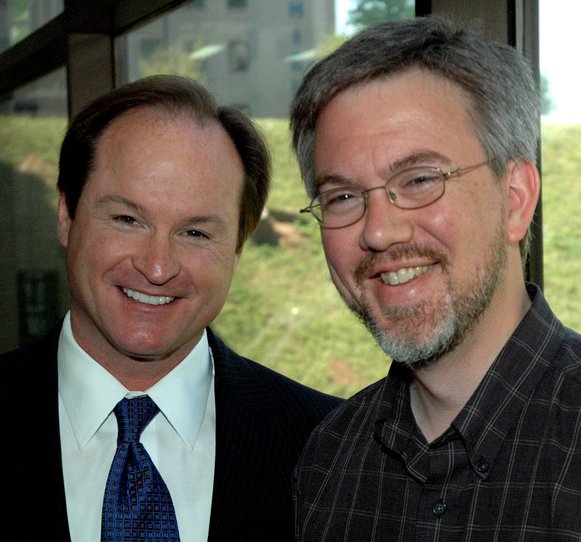Following up my entry about last night's edition of "Hardball", here's the relevant section of the transcript, an interchange between host Chris Matthews and William Donohue of the Catholic League for Religious and Civil Rights:
MATTHEWS: Lets talk about the president�s position.
What is the president�s position on abortion rights, Bill?
DONOHUE: The president is a opposed to abortion. The president is a pro life person. The president understands and if a women is pregnant and carrying a child, then if you kill that woman, you�re also killing the child as well. John Kerry doesn�t understand that. The president understands that life begins at conception, as does John Kerry, except that the president is willing to take it a step further and say that is why you cannot destroy an embryo. Because if you destroy and embryo, your destroying life.
MATTHEWS: There are two ways�Bill�
DONOHUE: Kerry, is the one that is really the problem.
MATTHEWS: There are two ways, Bill, to outlaw abortion in this country. One is to have a constitutional amendment to change the constitution overturn Roe v. Wade. Well, you know this as well as I do, just reciting the obvious. And the second is that you appointment Supreme Court justices, a couple of them at least and that shifts it back against the Roe vs. Wade position, the Scalia position.
Very clearly, the president of the United States has not promised to do either of those. He�s not promoting a constitutional amendment to outlaw abortion, to overturn Roe v. Wade. He�s not saying he�s going to pick pro life judges. How can you say he�s pro life, then, I don�t get it.
He�s not pro life.
DONOHUE: Take a look at the judges he has appointed already. I don�t think there�s any question about it, Kerry�s the one says there�s a litmus test. You can�t be pro life to be on a bench.
MATTHEWS: The president has not said he�s going to outlaw abortion. You know that, he makes a point of saying that all the time. I�m not going to outlaw abortion, he said. The country is not attuned to right now. He says it all the time.
DONOHUE: But Christians know as well as I do, most Americans don�t want to go back to the Roe v. Wade day, but they also don�t like abortion on demand. There�s a consensus in this country which neither the conservatives or liberals are paying attention to.
MATTHEWS: Don�t call the president pro life�don�t call the president pro life if you mean it...
DONOHUE: He is.
MATTHEWS: But he doesn�t want to outlaw abortion.
DONOHUE: Look, there are a lot of�the pope himself has said, he has come out and said it�s OK for a legislature to vote for a law which doesn�t outlaw all abortion, provide that it�s more restrictive than the current law. He didn�t say you have to get all or nothing.
MATTHEWS: I just think. I�m only interested in the politics of this.
The president�s getting vote from pro lifers because he�s pro life.
I don�t think they should be voting for think he�s going to outlaw abortion if he gets another years. Bill, if the president gets another four years is he going to outlaw abortion, is he going to be pro life president?
(CROSSTALK)
DONOHUE: No, I don�t think he�s going to -- I don�t think he�s going to outlaw abortion. But what I think what he�s going to do is put people on the court who won�t have reflexive tendency to say that, if in fact, you�re pro life you�re not allowed to get on the bench. That�s what Kerry wants to do. It even gets into the question of anti-Catholicism.
MATTHEWS: You know, Bill, you bought that from Ronald Reagan. I think these guys are very clever at suggesting a philosophical agreement with your position, fair enough they never deliver.
We�ll be right back with upon Monsignor McSweeney and Bill Donahue.
(COMMERCIAL BREAK)
"They never deliver." Read the whole transcript and you'll see that the point of the show was to persuade Catholics who are concerned about the abortion issue that they shouldn't make the issue a factor in their decision. In fact, the other guest during this segment, Monsignor Tom McSweeney of the Diocese of Erie, speaks of traveling around the diocese making that very case to the flock:
Chris, I�m speaking to you from Pennsylvania. I�m up in the northwestern corner of Pennsylvania. My diocese is the Erie Diocese, 13 counties. I�ve been around the diocese. I�m in charge of evangelization. Doing a lot of talking to people and getting a lot of counseling for this election because of some of the issues that are concerned here. And I tell you, the poll that you have quoted, the first one, not the one that bill Is referring to, resonates completely with the voices that I�m hearing here in Pennsylvania.
They want to know first of all, if they can vote for a candidate who clearly is, you know, pro choice and we talk about that. In talking with these people I�m finding that they are wanting to expand the conversation, the discourse to be all of the life issues, to develop a consistent ethic of life. And so some of them are liberating themselves from feeling badly about voting for Kerry, because they feel that, in fact, Kerry is offering offering more opportunities to expand the notions of life.
This is what I�m hearing. So the new polls that are indicating that there�s some success rate with Catholics seems to indicate that there�s a shift in the pro life movement in a way to expand that conversation to include all of the life issues. In other words, to connect violence of abortion with violence of poverty, violence of capital punishment, violence of war.
So Msgr. McSweeney offers a different definition of what it means to be pro-life, one by which John Kerry qualifies as pro-life, despite his consistent support for legal and federally-funded abortion, and by which the President presumably doesn't qualify.
But let's look at the specific issues raised by the monsignor:
The violence of abortion: Kerry will ensure that abortion remains legal on demand and will obstruct, either directly or through the judges he appoints, even marginal improvements in protections for the unborn. Bush will appoint strict constructionist judges and will continue to work, as he has in his first term, to do all that is politically possible to protect the unborn.
The violence of poverty: It's a stretch to treat this as a life issue -- being killed in the womb is a far more permanent disability than being poor -- but we'll do so for the sake of argument. President Bush wants government assistance to help people emerge from poverty into financial stability, rather than maintain people in a state of dependency, and Bush wants to involve faith-based organizations in helping the poor build new and better lives. Kerry has gone back and forth on the issue, supporting the failed "War on Poverty" approach for most of his career, but supporting welfare reform in 1996 when he faced a serious reelection challenge from Gov. William Weld.
The violence of capital punishment: This point confuses the punishment due to those who take innocent life with the murder of the innocent. The teaching of the Catholic Church does not demand the abolition of capital punishment. The Pope has written, in his 1995 encyclical, Evangelium Vitae, "punishment must be carefully evaluated and decided upon, and ought not go to the extreme of executing the offender except in cases of absolute necessity: in other words, when it would not be possible otherwise to defend society." Catholic doctrine notwithstanding, both the President and John Kerry support the use of the death penalty.
The violence of war: Here again, both candidates supported the war in Afghanistan, and both have supported the war in Iraq (at one time or another, in Kerry's case). And here again, there is an invalid moral equivalence drawn between those who murder the innocent and those who take up arms to defeat murderous tyrants. Whether you believe it was politically wise or not, discoveries like the mass graves in Iraq filled with the skeletons of children clutching their toys, provide a moral justification of the use of force to stop the continued slaughter.
George W. Bush stands for the defense of innocent human life from tyrants and butchers. John Kerry will do nothing to stop or even slow the slaughter of innocents in this country or to act decisively against terrorists and their state sponsors.
Here's another Kerry contradiction the Bush campaign would do well to exploit. John Kerry cannot try to wear the mantle of tough guy and maintain his claim to be more pro-life than Bush by this broader standard. In claiming that he will "hunt... down and kill" the terrorists, or subject them to the death penalty, he is just as out of step with the pacifist caricature of Catholic doctrine on these issues as President Bush is.



